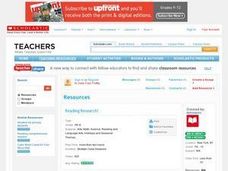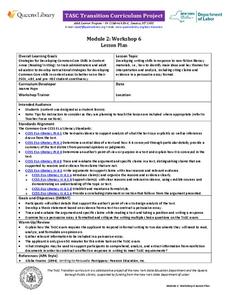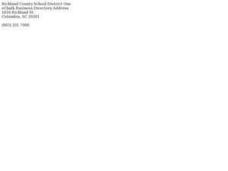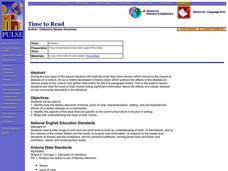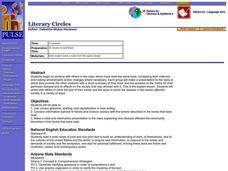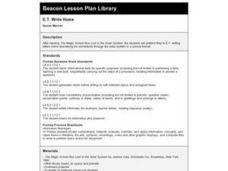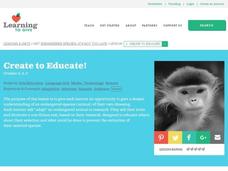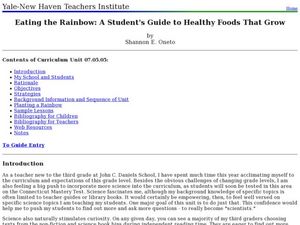Curated OER
Let's Get it Together! Reading to Learn
Let’s learn about frogs! Young readers are led through “Freaky Frogs,” a non-fiction article. Teach learners how to edit an article so there are fewer details to sift through. After talking through the article, they learn the six steps...
Curated OER
Natural Disasters: An Adventure in Non-Fiction
Students study different natural disasters. In this natural disaster lesson students read a nonfiction book followed by a discussion, an experiment, then collect illustrations from their experience.
Curated OER
Rachel's Life is in a Hole
Explore how lack of access to water impacts peoples' lives in poor countries. Through text reading and discussion, middle schoolers are presented with the story of a young girl who lives and functions with limited water resources. They...
Curated OER
Butterfly, Butterfly: Teaching Vocabulary
Kindergarteners practice new words through listening to and reading the science book Butterfly by Jenny Feely. The teacher will first choose words that are essential for understanding the text. Then, using pictures in the text,...
Curated OER
Wood
Students practice reading comprehension strategies. In this literacy and science lesson, students read a non-fiction article about wood and locate main ideas and details. Students construct a card game using information taken from the text.
Curated OER
Non-Fiction Read-aloud
Students listen to the reading of a book about the area of science they are currently studying.
Curated OER
Reading Research!
Students investigate the life of an animal and how it responds to winter. The lesson's focus is on reading and research skills using pictures to assist in the understanding of the information presented.
National Geographic
Plant Life
Looking for a guide to pair with non-fiction concept books? Intended to go with science-based leveled text mentioned in the resource, a unit allows for the study of plant life while enhancing academic vocabulary, language skills, and...
EngageNY
TASC Transition Curriculum: Workshop 6
Is a college education necessary for success in today's world? The class investigates the question, along with others at the end of the sixth workshop in a 15-part series. The lesson has four parts with multiple activities and...
Curated OER
The Beautiful Moon: Story and Comprehension
For this beautiful moon: story and comprehension worksheet, 3rd graders read a one passage about moon facts, then answer 5 multiple choice questions, with answer key provided.
New York State Education Department
TASC Transition Curriculum: Workshop 5
Are video games sports? Pupils investigate this question as well as various nonfiction selections to learn more about claims and the support that defines them. All of the selections mimic the rigor on state tests and encourage close...
Curated OER
Science Summaries are the Bomb!
Fifth graders read a dissection article and complete close reading activities for the text. In this reading skills lesson, 5th graders read an interactive frog dissection article in teams. Student teams complete a KWL chart and...
Curated OER
Time to Read
Students identify how the literary elements of theme, point of view, characterization, setting, and plot illustrate the effects of a certain disease on a community. They identify the aspects of the book that are specific to the...
Curated OER
Clustering
Fifth graders are introduced to the concept of clustering. In groups, they use their new science vocabulary words to put into a web or cluster. To end the lesson, they read a book related to electricity and write the definitions of any...
EngageNY
TASC Transition Curriculum: Workshop 12
How can opinions slant facts? Workshop participants learn how to examine primary and secondary sources and identify the author's point of view. They also examine how visual art impacts the meaning and rhetoric of sources. Full of...
Curated OER
How Cell Phones Work
Fifth graders are introduced to the text, LITERACY LINE viewing the contents page. They review the definition of explanatory writing; discussing the features used and complete a KWL chart to identify what they already know about how a...
Curated OER
Visualizing Trees
students draw what they visualize after the teacher reads a page from the book Oak Trees. They share their pictures and compare how they visualized the tree being described.
Curated OER
Literary Circles
High schoolers use correct grammar, spelling and capitalization in their writing. They connect information acquired in history and science classes with the events described in the books that were read. Students make a clear and...
Curated OER
E.T. Write Home
Students read the book, The Magic School Bus Lost in the Solar System, and discuss the planets visited by the characters in the book. They write journal entries from the viewpoint of E.T., writing letters home describing his travels in...
Curated OER
Endangered Species... It's Not Too Late
Learners choose an endangered species to research and report on. In this endangered species lesson, students complete a worksheet to gather information about their endangered animal and then use to write a book about the animal and...
Curated OER
Zoo Animal Experts
As part of an exploration of zoo animals, kindergarteners conduct research on their favorite animal and compile their information. Learners write about their animal in a journal and create a trading card. The culminating activity is a...
Curated OER
Lesson Two: Discover a purpose for keywords
Second graders research a topic in nature. In this research activity, 2nd graders pick a nature topic and discuss the keywords needed to find more information about that topic. They fill their information out on a organizer.
Curated OER
Eating the Rainbow: A Student's Guide to Healthy Foods That Grow
Third graders examine the nutritional value of different foods. In this health science instructional activity, 3rd graders create a daily log of the foods they eat and categorize them. They plan a healthy menu for their family.
Curated OER
Farm Animals
First graders conduct research about farm animals and what it is like to live on a farm. They explore a variety of websites and complete an online WebQuest. They select a farm animal, and write a report about their animal's...






